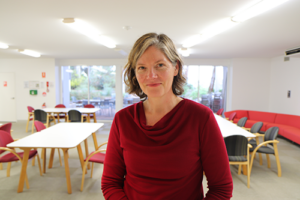
Survivors of stroke have more than their medical recovery to consider. They also face a difficult battle to rebuild their confidence and ability to manage a continuing path toward good health – and Flinders University’s Caring Futures Institute is devising plans to promote more effective self-management that will address this important issue.
Dr Elizabeth Lynch is lead investigator of ASSET-Stroke (which stands for “codesigning digitAl Solution for Self-Efficacy afTer stroke”), a research project that is making great advances in designing a program that can help self-efficacy through digital support.

“When people do not feel confident or empowered to manage their own health – which we call health self-efficacy – it impacts their ability to manage their health effectively,” says Dr Lynch.
“Work we have done leading into the ASSET-Stroke project has highlighted the large unmet information needs that people have after a stroke and that this has a negative impact on them being able to self-manage after stroke.”
This is a problem with far-reaching ramifications. One in five people in Australia will have a stroke in their lifetime. Stroke is a chronic condition, so people who survive their stroke need to manage the condition for the rest of their life. Self-management could take the form of getting enough physical activity, eating healthily, stopping smoking, maintaining a healthy weight, taking prescribed medication or doing recommended rehabilitation activities.
People with stroke and their carers will provide the essential input and feedback needed to develop and test an effective digital intervention that can best promote health self-efficacy in people with stroke.
To achieve this, the research team is firstly codesigning the digital intervention. “We are in the process of convening a Lived Experience workgroup where people with stroke and carers – which includes family members, partners or friends of people with stroke – advise what sort of digital platform should be used, and what facet of self-management should be addressed,” says Dr Lynch. “We will draft a digital intervention through close consultation with the Lived Experience workgroup.”
The next stage will see 15 survivors of stroke and their carers invited to use this new digital intervention and provide feedback on whether any problems require fixing. It will then be rigorously tested by up to 100 people with stroke for four weeks, to identify whether it is beneficial for self-efficacy after stroke – and especially different groups of people with stroke, through measuring the responses of people grouped by age and stroke severity.
“We will measure participants’ anxiety and depression, participation, health-related quality of life and self-efficacy,” explains Dr Lynch. “If the intervention is effective, it will support people with stroke to change their behaviours and successfully self-manage their condition.”
This project is also an important collaborative venture that aims to serve myriad objectives. It is funded through an MRFF Consumer-led grant, so a crucial outcome is to ensure that people with lived experience of stroke are contributing to the project at every stage.
“A co-investigator on the project had a stroke 15 years ago and is a powerful advocate for people living with stroke,” explains Dr Lynch. “I’m learning a lot from working with him and really appreciate his generosity in sharing his experience and viewpoint.
“I have a great team around me with lots of experience who are really supportive, so I love working with them all on a project that I think is really important.”
Stroke Foundation is also a partner in the project,and will provide the Flinders Caring Futures Institute researchers with valuable knowledge through its role as advocate for the Australian stroke community (comprising people living with stroke, clinicians and researchers). It will also help to recruit Lived Experience workgroup members and research participants who can provide ideal knowledge and feedback.
“If we develop an intervention that has a positive effect, we anticipate that Stroke Foundation will host the intervention on its website for long-term sustainability,” says Dr Lynch, “and that will provide the best possible outcome.”

